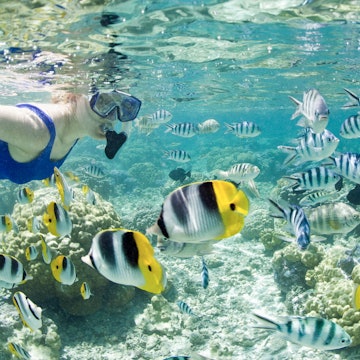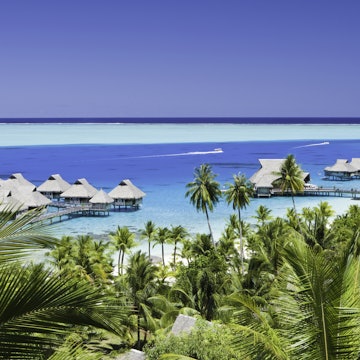
"Everyone belongs to the island" – exploring Nuku Hiva, the 'Land of Men'
Nov 30, 2019 • 6 min read

“We have a very tiny prison,” William says. We are standing at the edge of a dusty mountain path, overlooking the busy Taioha'e Bay. ‘Busy’, in this context, is a relative term. It is only busy in the sense that we left Nuku Hiva airport over an hour ago, and these are the first buildings we have seen since. None of them are taller than one storey.

We have driven through lush, endless valleys and juddered down winding cliffside roads, dodging the clusters of roosters stalking in and out of the Land Rover’s path. We have stroked wild ponies from the safety of the car window. To see civilisation again, even after an hour, feels surprising. We peer at it.

“Yes, it’s a very tiny prison. It has only three people in it.”
“What crimes have they committed?”
“Oh, there’s no crime here,” he says, getting back into his Range Rover. “Everyone knows each other too well.”
“Then who is in jail?”
William says something in French to the one member of our group who can understand it. “It’s a drunk tank,” he translates. “That’s who’s in there.”

Nuku Hiva is home to three thousand people, endless wild livestock, and three drunks. It’s the second largest island in French Polynesia, and the largest of the Marquesas, a sub-division of islands within Polynesia. None of our phones have signal: officially, the island has 2G internet, but no one ever seems to find out what or where that is. We will not have working phones again until we leave the island. If you're in search of a digital detox, this is the paradise island you've been looking for.

It is another half an hour until we reach the bay. Civilisation does not build up slowly; there is no gradual appearance of more buildings, no stretches of farmland to indicate civilisation. Here, the population is condensed into a few key areas, and the rest is bush. A horse without a saddle is tied to a tree, staring at us like a spaniel tied up outside a Tesco Express.
Clusters of men emerge from the trees, shirtless and in cargo shorts. All of them know our guide William, and all of them seem to occupy a permanent midpoint between working and hanging out. Every man on the island, aged eight to eighty, greets each another with a fist bump and a shaka – the 'hang loose’ finger-and-thumb sign most commonly associated with Hawaiian surfer culture, but is customary all over French Polynesia.

A group of young men with iPhone speakers in their backpacks and a wild boar tied to a rope are sitting in a glade, gathered around a campfire. Eventually, they will kill the boar, but no one seems to be in a hurry to get it done. The day is hot, the mood is good, and as William never tires of telling us “here, you don’t need money.”

A day later, I learn that Nuku Hiva literally translates to 'Land of Men'. With the exception of Australia’s Kangaroo Island, I struggle to think of a more aptly named place in the world. The Marquesan people are a famously proud culture, fiercely protective of their reputation for being fierce. Nuku Hiva is no exception.
We are taken to see the carving of a casse tête, a rosewood club. Casse tête, for those with rusty secondary school French (and you might want to brush up on it, before coming to French Polynesia) translates to 'brain teaser', and is lovingly named for its efficiency at bashing skulls in. Nuku Hiva’s archaeological sites are all accompanied with stories of the warrior meritocracy that their ancient society was so good at upholding, with lower-born men often reaching high tribal society through bravery, strength and cunning.

I ask if this is also the case with the women on the island. No, I am told. They were not offered the same place in tribal society. We move on. The following day, I am in the only pharmacy on the island. It is roughly the size of four phone boxes taped together, and an entire wall is dedicated to different brands of control-top underwear.
The restrictive, stomach-holding-in Lycra is familiar to most women via direct experience or whispered horror stories from friends. My own brief encounter ended when I decided mid-party that the hideous discomfort wasn't worth it and I uncermoniously fired them into the sanitary bin in the toilet cubicle. We are in 35C degree heat, the men are shirtless, and the women are buying girdles.

What’s fascinating is that the macho, warrior energy of the Marquesas has, over thousands of years and a population almost eviscerated by diseases introduced by European invaders, distilled into a kind of soft bro culture made up of freelance nature jocks. We stumble across a herd of goats, huddled precariously on a jagged slice of cliff hanging over Hatihe’u Bay. A trough of water has been left out for them. “Who put this out?” I ask, looking around. There are no houses, no fences, and it hasn’t rained in days. Where does the water come from?
Our guide shrugs. Someone, or several people, from somewhere. These goats are not farmed by people so much as they are under their stewardship. The goats are simply plucked from nature as required. Ditto the horses. Ditto the boar. A similar attitude is taken to produce. Breadfruit, taro, manioc and coconut grow in abundance, and smoke from the coconut skin fires can be seen from all over the island.

Even the imported produce has an eye towards sustainability. The lifeblood of the island is the Aranui, a ship that is half cruiser, half cargo ship. We drive down to the harbour and witness the incredible efficiency of the ship’s role: you see tourists descending from one side, and cargo from the other.
Bags and boxes are loaded into pick-up trucks with very little visible admin. Men drive up, load up, fist bump, and go. For anyone concerned about the effect of cruise ships on both the environment and the port communities where passengers rarely spend money, the Aranui is a fascinating case study.

Everything here is used, respected, replanted, regenerated. The island belongs to everyone, and everyone belongs to the island. Beautiful and idealistic as this is in theory, it can be interesting in practice. Particularly when the roosters have as much right to crow about Nuku Hiva as you do, and their preferred spot is right outside your door.

I’m staying in the Pearl Lodge, Nuku Hiva’s only luxury accommodation option, an idyllic little property with 20 bungalows, an infinity pool, and a private beach. It costs €243 a night to stay here, but no amount of luxury or expense can save you from the roosters. If you fancy a lie in on this paradise island, either pack your ear plugs or pray that one of those lovely resourceful Nuku Hiva men will get a sudden pre-dawn craving for roasted cockerel.

Stories abound of men who have visited the Marquesas and found it impossible to leave. Paul Gauguin and Jacques Brel both lived and died here. Herman Melville, before writing Moby Dick, found himself in Taipivai, living among the few remaining cannibal communities in the world. It’s not hard to see the draw.
Standing at the edge of the folding Hakui Valley, the thin mist from the Vaipō waterfall draped around it, Nuku Hiva makes you feel as though you are present at both the beginning and the end of the world. It’s astoundingly beautiful in its remote moodiness, the kind of sight that burns its shape into your mind. William’s right: you don’t need money to live here. Unless you're a woman expected to purchase a range of girdles.
Caroline O'Donoghue travelled to Tahiti with support from Tahiti Tourisme. Lonely Planet contributors do not accept freebies in exchange for positive coverage.













